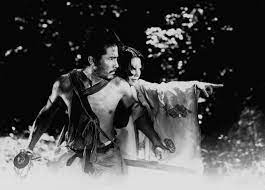28 October 2021
Art and Politics
Don’t mix.
By Neil Tidmarsh

There’s something very odd and very interesting at the heart of Ridley Scott’s new film The Last Duel, a serious flaw which tells us much about our current society and culture even though the film is set in the fourteenth century.
The film tells a true story. In 1386, Marguerite de Thibouville accused Jacques Le Gris of raping her. Jacques Le Gris denied the accusation and insisted on his innocence. Her husband, Jean de Carrouges, challenged him to trial by combat, a fight to the death in which divine providence would reveal innocence or guilt through victory or defeat. We see the crime and the events leading up to it three times, giving each of the three characters their chance to tell their version of events, their ‘truth’. The film-makers have acknowledged that they borrowed this technique from Akira Kurosawa’s classic 1950 movie Rashomôn.
Rashomôn tells a similar story. A samurai has been murdered and his wife raped. The four characters involved – the bandit accused of the crimes, the raped wife, the murdered samurai (via a medium) and a woodcutter who was a witness – each tell their version of the events, and their stories are of course strikingly different. In the bandit’s account, for instance, we see rape becoming seduction, the wife agreeing to abandon her husband and run away with the bandit, and the bandit killing the husband in a fair fight. The other three stories contradict this version and indeed each other.
In The Last Duel, however – and here’s the rub – the three stories are essentially the same. Jacques Le Gris insists on his innocence throughout the film but when he shows us his ‘truth’ – ie that he didn’t commit rape – what we see is unequivocally a rape. This is very odd indeed. The choice of narrative technique becomes a nonsense. Why tell the same story three times? There is one minor variation (in Jean de Carrouges’s version he presents himself as a loving and caring husband, but in Marguerite’s version he is revealed as a selfish and insensitive brute) but that isn’t enough to justify the repetitions. Why choose a narrative technique which on the one hand serves little purpose in your film and on the other makes the film tedious and over-long?
Could it be that, in this age of MeToo, the film-makers decided that it would simply be unacceptable to lend credence to a rapist’s lies and excuses, even temporarily? Could it be that someone in the producers’ studio took one look at an early draft of the script – a draft in which Jacques Le Gris’s ‘not guilty, gov, it wasn’t rape, it was seduction, consenting adults, she led me on, her word against mine, etc, etc’ version of events was to be dramatized on-screen as clearly as the bandit’s story in Rashomôn – and exclaimed “Holy shit, guys, what the hell do you think you’re doing? You’re giving Harvey Weinstein, Jeffrey Epstein and all the rest of their type a platform here! You can’t do that in this day and age! You and your movie will be torn to shreds on social media! Box office suicide, you schmucks!”
A cop-out? A failure of nerve? It’s interesting to contrast what was acceptable or unacceptable in a film in 1950 with what seems to be acceptable or unacceptable in a film in 2021: Rashomôn stopped short of showing us the actual rape, but did let the suspected rapist show us his version of events (however false it might be); The Last Duel doesn’t hesitate to show us the actual rape (not once but twice, a scene graphic enough to be shocking and disturbing, as indeed it should be, but not so graphic as to be exploitative) but stops short of letting the accused rapist show us a version of events in which he is innocent (however false it might be).
The Last Duel is an overtly feminist film, determined to address the subject of rape openly and seriously, as our age rightly demands. As such, it’s firmly and explicitly on the side of Marguerite de Thibouville. Her accusations and Jacques Le Gris’s denials have been debated and examined by historians in France for more than six centuries. There were claims that it was a case of mistaken identity, or that it was a plot by her and her husband to destroy Le Gris. But the film presents Marguerite as an innocent victim and reliable narrator – the film’s only reliable narrator – from beginning to end.
The film’s feminist politics and MeToo ideology aren’t the problem in themselves (politics and ideology which this column and no doubt most of its readers are broadly in sympathy with anyway). And this certainly isn’t to argue that Harvey Weinstein, Jeffrey Epstein and all the rest of their type should necessarily be given a platform anywhere outside a courtroom. The problem here is that politics and ideology – any politics and ideology – will have a distorting and destructive effect on any artistic or creative vehicle made to carry them if they are piled on too heavily. Any film, play, novel or poem which pushes its ideas and convictions too hard or lays them on too thickly risks damaging itself. Dogma and propaganda are the enemies of art. It seems that the film’s feminist agenda is so heavy-handed that any lies, excuses, delusions Jacques Le Gris may have can’t even be examined. This is disastrous for the film, given its chosen structure. It would have been a richer, more interesting, more sophisticated and more intelligent film if it had made best use of the Rashomôn structure’s potential. It would even have been a better film – a less seriously flawed film – if it had simply abandoned the Rashomôn structure and told just Marguerite’s story in a straightforward, traditional, chronological way.
This problem – of art being compromised, distorted or even wrecked by the pressure of politics and ideology, particularly fashionable ideology – does seem to be typical of our age. This column has been here before – see its review of the Bridge Theatre’s recent production of A Midsummer Night’s Dream (Shaw Sheet issue 207, 20 June 2019).
There is one more way in which the film reflects our times and how society and culture have changed in recent years. In 1950, Rashomôn showed that it’s necessary to consider as many subjective ‘truths’ as possible if the objective truth is ever to be discovered – a difficult and sometimes perhaps even an impossible process, it acknowledged, but an absolutely essential one nevertheless. In 2021, The Last Duel is concerned with actually only one ‘truth’, and can’t really be bothered with the others.
Kurosawa’s The Seven Samurai was remade in the USA as the classic Western The Magnificent Seven (and as the classic animated movie A Bug’s Life); his Yojimbo was remade in Europe as the classic Western A Fistful of Dollars; sadly, The Last Duel hasn’t worked the same alchemy with Rashomôn.
Cover page still from Rashomôn – flickr / japanesefilmarchive / Creative Commons


